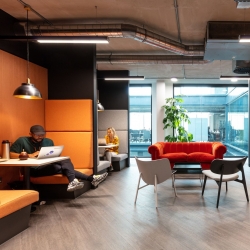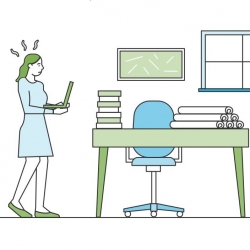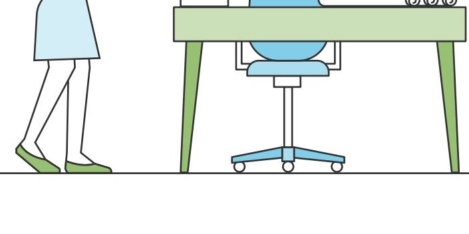September 9, 2021
Search Results for: happiness
August 23, 2021
Hybrid is most popular working set-up, but most would rather be full-time in workplace
by Jayne Smith • Flexible working, News, Working lives
 ‘Hybrid’ is the ideal working environment among Brits today, but twice as many workers would like to be 100 percent office-based than work permanently from home, according to the latest research from LifeSearch. (more…)
‘Hybrid’ is the ideal working environment among Brits today, but twice as many workers would like to be 100 percent office-based than work permanently from home, according to the latest research from LifeSearch. (more…)
July 13, 2021
Four in five employees feel colleagues aren’t heard equally
by Jayne Smith • News, Working culture, Working lives

As organisations increasingly struggle to retain their current workforce as well as hire fast enough to keep up with consumer demand, new research from The Workforce Institute at UKG exposes a troublesome gap between employee voice and employer action that — if left unresolved — can disengage workers, fuel turnover, and hinder business performance. (more…)
June 14, 2021
Many employees lack workplace friendships
by Jayne Smith • News, Wellbeing, Working lives
 A new study conducted by Wildgoose, into friendship in the workplace claims the impact of working from home on personal connections in the office. One in 20 employees starting a new job while working from home have found it hard to make colleague friendships. This is equivalent to over 300,000 employees struggling to integrate and make friends in a new role. (more…)
A new study conducted by Wildgoose, into friendship in the workplace claims the impact of working from home on personal connections in the office. One in 20 employees starting a new job while working from home have found it hard to make colleague friendships. This is equivalent to over 300,000 employees struggling to integrate and make friends in a new role. (more…)
June 10, 2021
UK organisations risk losing talent if lacking in empathetic leadership
by Jayne Smith • News, Wellbeing, Working culture
 New research commissioned by Workplace from Facebook claims there is a growing demand from UK employees for more empathetic leaders since the pandemic. (more…)
New research commissioned by Workplace from Facebook claims there is a growing demand from UK employees for more empathetic leaders since the pandemic. (more…)
May 28, 2021
Helsinki, Oslo and Zurich are cities with the best work-life balance
by Jayne Smith • Flexible working, News, Working culture
 Mobile access company Kisi has released their annual study examining which cities around the world promote the most holistic work-life balance. With the goal of enhancing an individual’s personal and professional life through technological innovation, Kisi has endeavored to find out which coveted metropolises worldwide are meeting their residents’ lifestyle demands to make their city a more attractive place overall to work and live. (more…)
Mobile access company Kisi has released their annual study examining which cities around the world promote the most holistic work-life balance. With the goal of enhancing an individual’s personal and professional life through technological innovation, Kisi has endeavored to find out which coveted metropolises worldwide are meeting their residents’ lifestyle demands to make their city a more attractive place overall to work and live. (more…)
May 26, 2021
New research looks inside the UK ageism epidemic
by Jayne Smith • News, Wellbeing, Working culture
 New research conducted by McCarthy Stone, claims to expose the true scale of Ageist Britain, reporting that over a quarter (27 percent) of over 65s in the UK – equivalent to more than three million people – have been victims of ageism. 60 percent of UK adults believe it’s a problem that needs fixing. (more…)
New research conducted by McCarthy Stone, claims to expose the true scale of Ageist Britain, reporting that over a quarter (27 percent) of over 65s in the UK – equivalent to more than three million people – have been victims of ageism. 60 percent of UK adults believe it’s a problem that needs fixing. (more…)
May 20, 2021
Remote work is creating inclusive work experiences
April 16, 2021
Hybrid working risks becoming a meaningless term
by Ben Gillam • Comment, Flexible working, Workplace design
 Hybrid working runs the risk of becoming a blanket term, interpreted on a very surface level, when it has the potential to offer a much greater opportunity for businesses to open up and re-examine the culture and experience of their staff, alongside where they want to take their business in the future, as well as fast-tracking mental health and wellbeing to play a central role in workplace strategy. (more…)
Hybrid working runs the risk of becoming a blanket term, interpreted on a very surface level, when it has the potential to offer a much greater opportunity for businesses to open up and re-examine the culture and experience of their staff, alongside where they want to take their business in the future, as well as fast-tracking mental health and wellbeing to play a central role in workplace strategy. (more…)
April 13, 2021
After a year of lockdowns, people are burnt-out but happier
by Steven Buck • Comment, Wellbeing
 Glint’s latest insights report shows that there is a worrying increase in employees experiencing challenges with their mental health, with burnout risk trending upwards year-over-year. That spiked in late March 2020 and climbed by nearly 4 percent between August and December 2020. That’s not a big surprise, given the first challenging months of the global pandemic. Paradoxically, employees say that despite feeling burnt-out, they also feel happier at work at the end of a year of lockdown than they did at the start. Is this some sort of contradiction—or evidence of something very encouraging about the state of HR? (more…)
Glint’s latest insights report shows that there is a worrying increase in employees experiencing challenges with their mental health, with burnout risk trending upwards year-over-year. That spiked in late March 2020 and climbed by nearly 4 percent between August and December 2020. That’s not a big surprise, given the first challenging months of the global pandemic. Paradoxically, employees say that despite feeling burnt-out, they also feel happier at work at the end of a year of lockdown than they did at the start. Is this some sort of contradiction—or evidence of something very encouraging about the state of HR? (more…)






 New research from
New research from 






 According to new data from
According to new data from 
 Just as the pandemic has forced many to re-think their relationship to the office, developers and building owners have been forced to reassess the service they offer to meet the altered needs of occupiers, according to research by
Just as the pandemic has forced many to re-think their relationship to the office, developers and building owners have been forced to reassess the service they offer to meet the altered needs of occupiers, according to research by 









July 23, 2021
The unshocking truth about work and workplaces
by Mark Eltringham • Comment, Workplace design